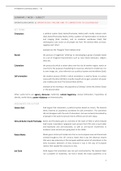IA Midterm summary (week 1 – 6)
SUMMARY / WEEK – SUBJECT
ORIENTALISM (WEEK 1) ORIENTALISM / RACISM AND ITS CONNECTION TO COLONIALISM
KEY TERMS
Orientalism a political system (Said, Burke/Prochaska, Marks) with mostly colonial roots
(Said, Burke/Prochaska, Marks, Dirlik), a pattern of representation in literature
and imaging (Said, teacher), and an academic worldview (Said) that
stereotypes/ uses racism on all people not from The General West as lesser,
negative and ‘other’.
example are the ‘thuggies’ from Indiana Jones
Racism the process of negatively ‘othering’ or stereotyping a group of people based
on a set of imagined characteristics such as race, blood, behaviors, religion,
dress etc.
Colonialism the process by which a nation takes over the rule of another region, nation or
country for the purpose of exploiting its resources, attempt to modernize it in
its own image, etc.; also referred to as a political system and worldview (Said).
Self-orientalism the modern process (Dirlik) in which orientalism is used by Asians in contact
zones with the West (Dirlik) to mystify oneself and so gain a position of power
over intellectuals from The General West (Dirlik).
example of this working is the popularity of ‘fantasy’ anime like Demon Slayer
in The General West
Other useful terms are agency, discourse, modernity, cultural hegemony, mutual imbrication / layerdness of
identity, world history, power imbalance and intertextuality.
ARGUMENTS PER AUTHOR
Edward Said Said argues that colonialism, a political system based on racism, The General
West, fostered an (academic) worldview he calls orientalism. This worldview
did not disappear with the end of colonialism, but was instead internalized by
all people in the world insomuch that its effects can be seen today.
Edmund Burke / David Prochaska Burke and Prochaska give an overview of the state of field in which Edward
Said’s book ‘orientalism’ appeared, and uncover that it fits into a much older
anti-imperialist and anti-colonialist, as well as anti-racism movements in
academic work and activism going back to the 1940s.
Robert Marks Marks gives a history of modernism from a non-European view and traces back
oriental thought to the 13th century. Notes that it was the Ottoman empire
that was a key-adversary in the European political variant of orientalism in the
early European takeovers of Asia, because it was in the way of European
nations that needed the resources in Asia.
Arif Dirlik Dirlik argues that orientalism was not just constructed by The General West
nor a problem of modernity, nor that it leaves the Asians powerless in its
1
, IA Midterm summary (week 1 – 6)
contact with The General West. Instead, the process of self-orientalism used
in contact zones, a theory by Mary Louise Pratt, with The General West by
Asians gave them a new power position.
WHO WROTE WHAT
Edward Said wrote ‘Orientalism’ the book
Edmund Burke / David Prochaska wrote ‘Orientalism from postcolonial theory to world history’
Robert Marks wrote ‘The making of the modern world’ book
Arif Dirlik wrote ‘Chinese history and the question of orientalism’
EXTRA INFORMATION GIVEN IN CLASS
ON EDWARD SAID’S ORIENTALISM THEORY AND BOOK
• Critiques of Edward Said’s ‘Orientalism’ like Edmund Burke / David Prochaska focus on the fact that the
theory is text-based, a-contextual and a-historical, and does not provide the orientalized with agency,
when self-orientalism has been shown to be empowering also.
• Notes that Edward Said’s ‘Orientalism’ was highly critiqued in Leiden because it’s scholars had and have
a lot of oriental scholars and orientalist studies, and this book felt like a personal attack to them.
• Said’s ‘Orientalism’ made use of concepts by Foucault, Flaubert and Gramsci. It used Foucault’s concepts
of discourse, and modernity. Discourse meaning the way all historical material influences the worldview
of academics as their writing is usually based on each other’s work (also called intertextuality) and
modernity meaning an imaginary concept of being better by which the West could exercise power over
other nations. The concept of power imbalance by Flaubert works like this as well. Cultural hegemony, a
concept by Gramsci states that cultural dominance of the West on the East worked by force ánd consent
of both those who use and receive it.
ON THE MEANING OF ‘ORIENTALISM’ AS A CONCEPT
• Notes that orientalism is also a pattern of representation of non-western peoples, and that this is why
Edward Said’s ‘Orientalism’ focusses on literature and imaging in British-French and American context of
the Middle East and Middle-eastern peoples.
ON WHY ‘ORIENTALISM’ A BEHAVIOR APPEARED IN ACADEMICS
• Another reason why orientalism appears in the 1970’s is the ignoring and disillusionment of new non-
Western scholars, who had become academics and wanted to point out they had been left out. There is
a connection to women’s studies and minority studies here. It not surprising then that Edward Said
himself was a palastinian-american.
• Other ways to see orientalism is as a career path in both academics and by corporations, as well as a
strategy to understand ‘the east’. It is also a way to exert power unconsciously as a reflex.
2




